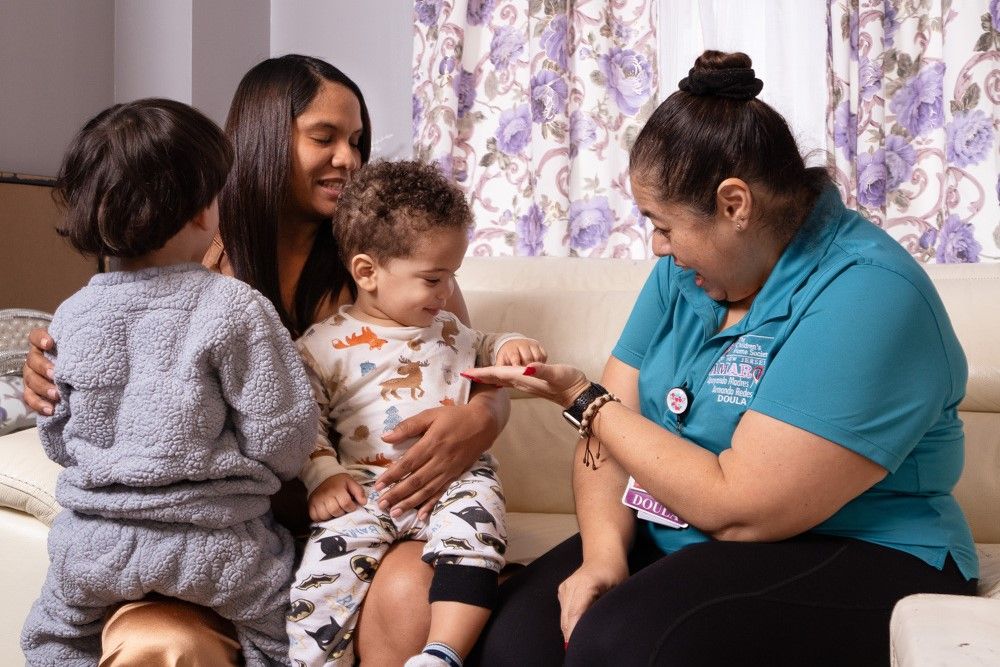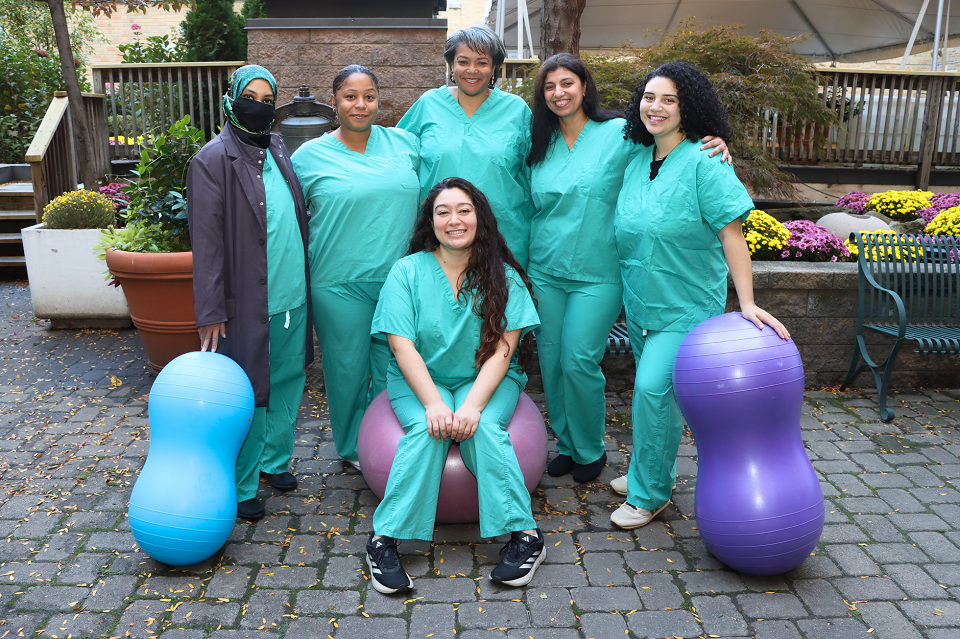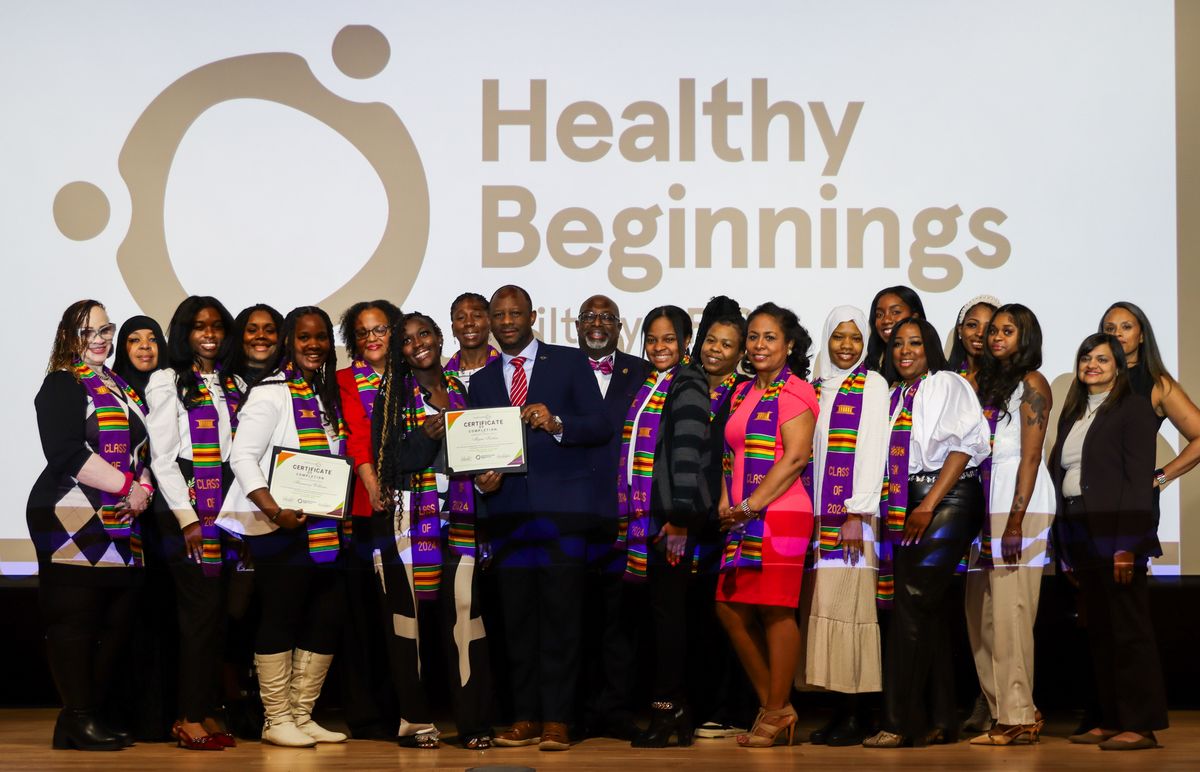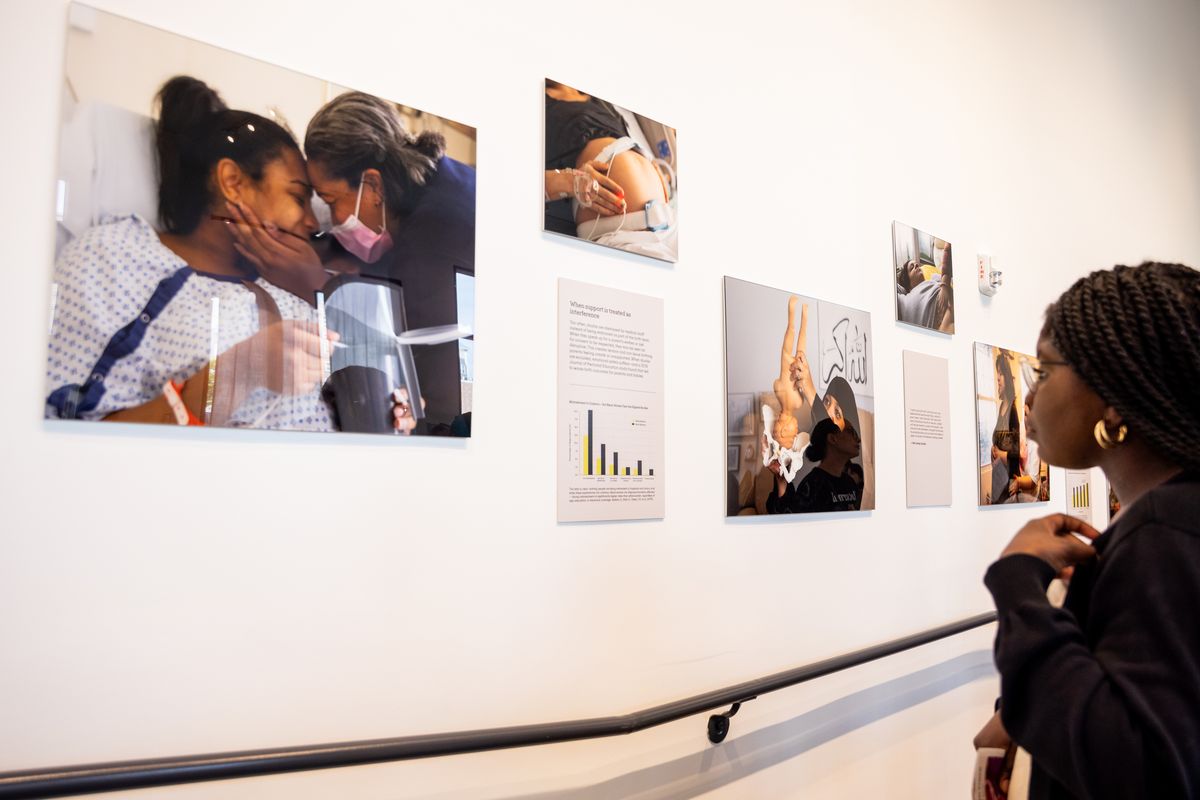👋 The first time I came across the concept of weathering — how the cumulative stress of racism ages the bodies and endangers the health of mothers and babies of color — I was stunned. It was a 2018 article in the New York Times Magazine by Linda Villarosa explaining something no medical chart could: why Black women, regardless of income or education, face some of the worst maternal health outcomes in the country.
At the Burke Foundation, one of our responses was to invest in community doulas who compassionately guide birthing families through a complex and often unwelcoming system. What we’ve seen from partnerships with community doulas is nothing short of extraordinary.
With doulas at their side, families experience fewer preterm births, fewer complications, and stronger starts for babies and parents.
That vision comes to life in the recently launched The Courage in Care, a public exhibit in Newark, calling attention to the work of community doulas who are reshaping maternal health in New Jersey and beyond. Created in collaboration with a statewide coalition of doulas and birth leaders, the exhibit lifts up the voices and experiences too often left out of headlines and policy decisions.
Check out a video reel of the exhibit’s opening night from our friends at NJPAC. ⭐
This month, Starting Early expands on the exhibit, highlighting remarkable doula-centered initiatives transforming maternal health across New Jersey. From hospital partnerships to community-based models, we profile the people and programs building a more just and joyful system of care.
Atiya Weiss
Executive Director, the Burke Foundation
1 big thing: Doulas deliver but systems haven’t caught up

The U.S. has the highest infant and maternal mortality rates among high-income countries and simultaneously spends the most on healthcare, according to a 2023 Commonwealth Fund report.
The big picture: Inequity is built into our maternal and infant health. Black women are 3-4 times more likely to die from pregnancy-related causes than white women. Families that struggle to make ends meet face higher risks of complications, Caesarean births, and postpartum challenges.
Doulas — especially those living in the same communities as their clients — play a powerful role in closing these gaps by providing emotional, physical, and informational support to families during pregnancy, birth, and postpartum.
By the numbers: Doulas drive better results for families.
One of the most cited studies on labor support reviewed 27 clinical trials and found continuous support from a trained doula during labor led to moms being:
39% less likely to have a Caesarean birth
35% less likely to report a negative birth experience
15% more likely to have a spontaneous vaginal birth
Further research shows that high-risk patients supported by community doulas are less likely to experience birth complications or have low birthweight babies — and more likely to initiate breastfeeding and be satisfied with their care.
Doulas reduce harm — and healthcare costs 💲: In 2019, New Jersey made the smart move of reimbursing doulas through Medicaid, the state-federal program that provides healthcare to people who otherwise couldn’t afford it.
A 12-state study in the Midwest found that making doula-supported births available to more people could save Medicaid $58 million in the states studied and prevent more than 3,200 preterm births.
It’s a clear win: better care for families, and real savings for public systems.
Yes but: This critical support is out of reach for too many families. There are too few doulas. And most hospitals and insurance systems still don’t consider this proven, cost-effective support part of standard maternity practice.
2. Scaling a Trenton community doula model built to last

The capital of New Jersey, Trenton, with nearly 1,500 births per year, faces stark maternal health disparities and limited perinatal provider availability. Community-based solutions are filling the gap.
The Children’s Home Society of New Jersey is expanding its AMAR Community-based Doula Program — aiming to reach half of all births in Trenton with culturally responsive doula care by 2027.
AMAR began in 2019 as an initiative serving Spanish-speaking families in Mercer County. Building on the HealthConnect One model, AMAR doulas are trained from the community and provide an average of 14 home visits pre- and post-birth. Most doulas on staff are salaried and receive benefits.
📈 The results are striking — The 329 AMAR families experienced:
65% fewer preterm births
88% fewer low birthweight babies
16% fewer low-risk C-sections
64% exclusively breastfeeding at 3 months postpartum
Building on this success, CHSofNJ began expanding community doula services to Black and Eastern European families in Trenton. A $631,500 federal appropriation secured by Rep. Bonnie Watson Coleman, along with a multi-year investment from Burke plus state, private, and national funder support, helped launch this next phase.
Why it matters:
The Trenton initiative is a model for scaling community-rooted doula care.
Investing in trusted perinatal support makes births safer, boosts maternal health equity, and saves money.
This work aligns with growing national momentum to bring high-quality doula care to more families.
“There’s a continuum of strong, dedicated, effective services to support maternal health that’s indispensable if we want long-term change. Feel-good programs aren’t enough anymore. What gives me hope is to see visionaries in the field willing to connect the dots for a strong New Jersey.” — Maritza Raimundi-Petroski, vice president, Children’s Home Society of New Jersey
3. St. Joseph’s Health bets on doulas — and sees early results

What’s new: St. Joseph’s University Medical Center in Paterson is testing a groundbreaking model in New Jersey: doulas as full-time, salaried members of the hospital care team.
Why it matters: While most doulas work independently, the St. Joe’s pilot begun last year adds 6 multilingual doulas — fluent in Spanish, Bengali, Arabic, English, and American Sign Language — on 40-hour shift schedules with benefits, working alongside nurse midwives, nurses, and physicians. The hospital aims to create a sustainable perinatal workforce pathway and improve care for moms and babies in a region where birth outcomes often fall below state averages.
By the numbers:
Women supported by a St. Joe’s doula were 74% less likely to deliver preterm and 63% less likely to have a low-risk C-section.
They were nearly twice as likely to attend their postpartum check-up, a key touchpoint for maternal health.
Doulas now support 28% of women during labor — a figure hospital leaders hope to grow.
Yes, and: The doulas are becoming certified lactation counselors to provide timely breastfeeding support and are now integral to the hospital’s maternity culture. Early survey results show patients rating their doula experience at 9.8 or more out of 10.
“My doula absolutely helped with all the comfort positions that she placed me in. There is no way I could have done it without her!” — St. Joe’s patient
What’s next: Hoping to make these roles permanent, hospital officials are tracking results, cost savings, and patient satisfaction to make the case.
“Our doulas have brought a special and engaging dimension to our maternal and fetal health unit. As each day passes, it gets harder to remember what care looked like before their arrival.” — Dr. Roger Kierce, OB-GYN chair, St. Joseph’s Health
4. Creating super doulas in Newark🎓

South Ward Healthy Beginnings is investing in doulas to transform maternal health. Led by BRICK, a trusted, community organization supporting families, the initiative targets longstanding health and economic inequities in the South Ward — home to 45,000 residents. In 2021, 75% of children under age 5 in the South Ward lived below the poverty line. And in 2022, only 51% of pregnant people in Newark accessed early prenatal care — well below the state average.
To close these gaps, South Ward Healthy Beginnings created the Perinatal Workforce Pathways Program to train local residents as doulas, community health workers, and lactation specialists. The goal: equip community members to provide culturally relevant, trusted care, and build career pathways in the process.
What’s happening: A new Community Perinatal Health Associate program is supercharging traditional doula care by adding more training in breastfeeding, childbirth education, trauma-informed care, and case management, so doulas can do more as advocates and care navigators for birthing families.
Why it matters: These doulas bring local insight and cultural fluency to their work. Their presence helps bridge gaps in care and combat racial health disparities.
The number one complaint among new mothers of color is that care providers ignored requests for help. South Ward Healthy Beginnings addresses this by training residents to support their neighbors — while also fostering economic mobility and stability through maternal health careers.
Milestone: In February, 13 doulas completed the 6-month training and now support Newark families as doulas and breastfeeding peer counselors.
What’s next:
A new group launches in June with enhanced lactation training to eventually help doulas earn their Certified Lactation Counselor and International Board Certified Lactation Consultant credentials — key to unlocking insurance reimbursement.
In partnership with Civitas Strategies, South Ward is providing ongoing business support, coaching, and billing tools during and after training.
5. Centering doulas, reimagining birth — new exhibit launches in Newark 💜

On April 29, The Courage in Care: Community Doulas and the Joyful Revolution of Birth opened at Newark ArtSpace, marking a powerful moment in the movement for birth equity. The multisensory exhibit celebrates the wisdom, labor, and essential role of community doulas in New Jersey’s maternal health landscape.
🔍 Inside the experience: Divided into 6 themed zones, the exhibit offers an immersive, reflective journey:
Visitors use handheld audio devices to hear New Jersey doulas’ stories.
The Weight We Carry honors the grief, trauma, and emotional labor doulas witness and hold.
Visuals, objects, and soundscapes convey challenges doulas face and the power of their care.
More than an exhibit, The Courage in Care is a call to action — to invest in community doulas as essential, well-compensated members of the perinatal workforce who are welcomed, respected, and valued in every healthcare setting.
Visit the exhibit at Newark ArtSpace
🗓 On view through July 15
🕚 Thursdays – Saturdays: 11 a.m. – 5 p.m. | Sundays: Noon – 5 p.m.
📅 Appointments are also available outside gallery hours
📧 Contact: cheyenne.ceasar@newarkarts.org
Doula guides are available for organized tours.
The roundup
Celebrating dads! As we look toward Father’s Day on June 15, we’re lifting up how fathers are bringing new approaches to care and showing up with purpose — from local communities to national conversations.
💪 Showing up boldly: Peter Bullock, founder of Hey Black Dad, is reshaping the narrative around fatherhood in maternal and infant health. “We’re not asking to be included as an afterthought. We’re already here,” he says, underscoring the vital role fathers play from the very beginning. Follow Hey Black Dad on Instagram: @heyblackdad.
💕 Transforming care together: Explore how fathers and partners shape birth equity at the 2025 Virtual Summit from the Mom and Baby Action Network June 17. Free registration available now.
👪 Redefining fatherhood: Join Moms First and Equimundo for The Future of Fatherhood Summit June 5 and examine modern fatherhood through policy, culture, care, and work. Register to attend in person or watch the livestream.
